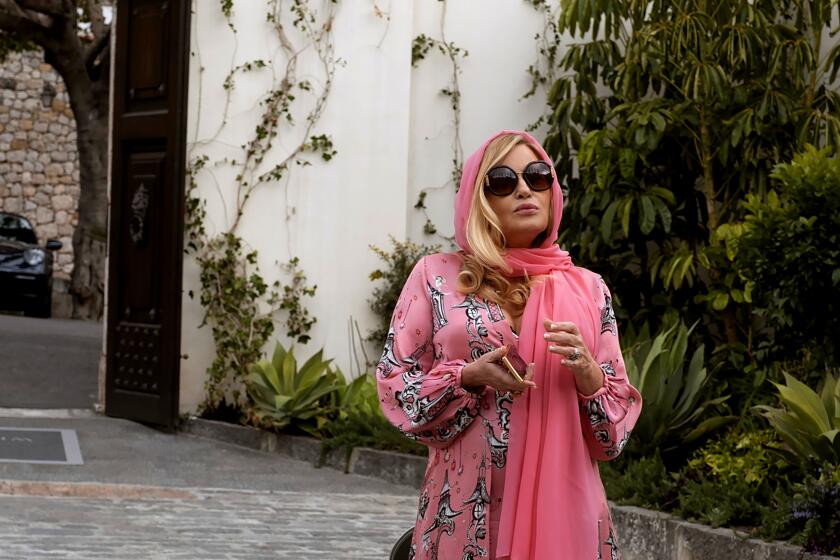TV keeps finding new ways to influence pop culture. ‘White Lotus’ music may top them all

- Share via
If you were an HBO executive who happened to be at the Coachella music festival in April, you probably witnessed a moment that would have been unfathomable only a few months earlier. At the apex of dance music duo Sofi Tukker’s Saturday evening set on the massive outdoor stage, the pair had tens of thousands of festival-goers enthusiastically jumping and swaying to ... a remix of the theme from “The White Lotus” Season 2.
Television is constantly finding new ways to influence pop culture, but for two-time Emmy-winning composer Cristobal Tapia de Veer, these sorts of anecdotes are not only “fulfilling” but a “cherry on top” of what has been a surreal “White Lotus” experience.
“This theme took on a life of its own. That’s really not something I was planning, or I was trying to make a hit or anything like that,” Tapia de Veer says. “It’s a very welcome surprise, and it makes me happy to connect with lots of people. I suppose I’m getting a bit of a rush more like a pop artist putting out a song or an album that is not related to a show or anything like that. Now it feels like it became its own thing somehow, and it is shocking really how big it became.”
The composer has already experienced the approval of his peers by winning the dramatic score and main title theme music Emmys for the inaugural season of “White Lotus” last September. His work on the Sicily-set follow-up season earned even more accolades from critics, but his mind was admittedly elsewhere on Emmy nomination day. He was concerned for Kim Neundorf, his colleague who also received a “music by” credit but who didn’t make the cut for the dramatic score category because her total contributions missed the mark by just one qualifying minute. The production asked the Television Academy to reconsider its decision, but to no avail.
“People who voted for us, for the nomination, they vote for how they feel about the show in general or the episode that they watch. And I don’t think that having one minute less of music for Kim would change that,” Tapia de Veer says. “I’m really happy that people connect so much with ‘The White Lotus.’ And I’m thankful that they voted for the music, but I’m slightly uncomfortable with the fact that her name is not there.”
‘The White Lotus’ (and Jennifer Coolidge) are back, this time in Sicily. More dark romp than mystery, it fails to build up a narrative head of steam.
As for his own nominated music this year, Tapia de Veer says his process with Mike White, the maestro behind “The White Lotus,” has always been different. For Season 2, Tapia de Veer and Neundorf began composing themes from the completed scripts they were provided before filming began. That insight revealed the second go-round was going to be a funnier, sexier and darker escapade than the Hawaii-set season, which he notes was “more goofy even when it was sexy.” And while they might have included some drums from the first season where appropriate, this score needed a “certain edge.” Especially when it came to the sex scenes.
“We knew we didn’t want music in the R&B [vein] or stuff like that,” Tapia de Veer says. “We wanted something a lot more dramatic and maybe insinuating dark things to come later on. There’s a certain drama to the music in the second season, and I feel that it’s much more dominant than in the first. And I suppose that leads to a much darker ending, so I suppose we were preparing the ending throughout the show in a certain way.”
Yet there were moments when White would ask for a piece of music for a scene that sounded similar to some of Tapia de Veer’s previous work on projects such as “Black Mirror.” Or the writer and director would find new places for those already-composed themes where Tapia de Veer didn’t expect them. Still, there are a few sequences he’s personally fond of. One in particular involved stars Beatrice Grannò and piano player Federico Scribani frolicking in a church.
“They’re in this real religious place and there’s all kinds of stuff happening, and the music is connecting all of these images in a way that I found playful and somehow operatic in a way,” Tapia de Veer notes. “It made the characters feel a bit like they were in an opera, the music being really dramatic and big in places and funny. It’s almost like a Broadway show a little bit in this episode.”
Tapia de Veer circles back to Neundorf, a composer whose music is also on every episode of the season, he says.
“She wasn’t helping me out with my tunes or anything like that. She wasn’t doing some ghostwriting,” the composer insists. “I know that people work with lots of people around them. You hear stories about the assistant doing a lot more than you think they’re doing, but for me, I’m not comfortable with that system of having a brand or something and to have other people not [getting credit for the] music.”
He adds, “For me, this arrangement, I was happy to make music with her, and in my mind, we were two composers making this score.”
More to Read
From the Oscars to the Emmys.
Get the Envelope newsletter for exclusive awards season coverage, behind-the-scenes stories from the Envelope podcast and columnist Glenn Whipp’s must-read analysis.
You may occasionally receive promotional content from the Los Angeles Times.











